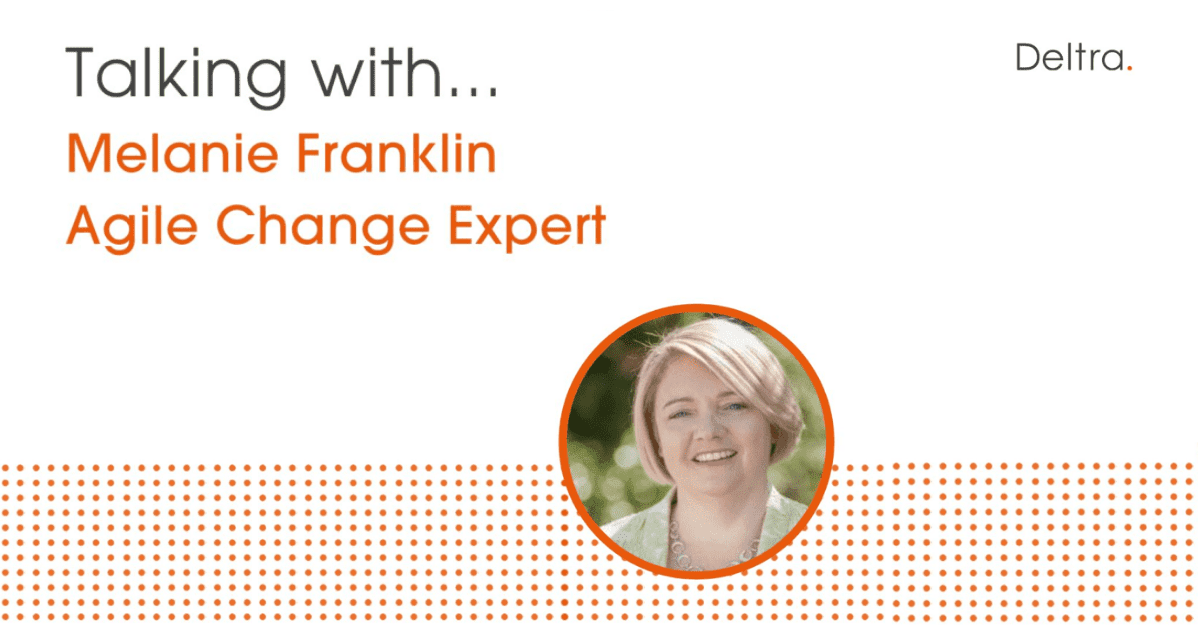Talking with… Melanie Franklin, Agile Change Expert
Watch on-demand »



Few things over the last few years have been as certain as change. Companies had to adopt new ways of working, undergo digital transformation, and handle employee stress, all at a time when the business landscape sat on shaky foundations. Business leaders need to know how to manage change in 2022 and beyond, as it certainly won’t stop being a consistent feature of business life.
In this episode of Talking with…, Deltra’s Senior Consultant Emma Fowler sat down to discuss these trends, so that change leaders can be prepared for the year ahead. It’s a fascinating conversation for anyone in the change and transformation space.
You can listen to the episode Watch On-Demand or keep scrolling to read a summary.
Melanie believes that we must do a better job of communicating the value of change management. Leaders know the benefits they want from projects and programmes, but don’t understand that change management acts as a gateway to those benefits. Melanie suggests speaking in simple terms that highlight the power of change management. At its core, change management is a risk management strategy. It reduces the risk that the reputation of the business will be damaged if customers experience issues, and it equally reduces the risk that staff will be overloaded
An issue that change managers face is that many don’t diligently collect data to evidence the outcomes they produce. Many change managers are ‘people people’ and like to get ideas of how people are feeling, but concrete evidence is needed to further communicate the value of change management. Melanie encourages change managers to collect information on participation levels and positivity levels before, during, and after the change, to show the impact that change management has had.
Melanie also thinks that we should tie change that is happening right now, like hybrid working, to future change. That way, senior leaders will have an easier time understand how change management is crucial.
Interestingly, Melanie looks to neuroscience for ways to be a better change leader. Ultimately, change is a psychological process, and it impacts a diverse range of people with diverse experiences. However, there are certain universal truths about humans that change managers need to be aware of in order to be more effective in their roles.
Melanie pointed out some examples, like how we are wired to look for negatives rather than positives, or that how we react to a message is largely driven by our emotional state at the time of receiving it. Future rewards are also far less appealing to our brains than immediate rewards, so it can be hard for people to connect with the promise of future rewards.
In practice, that means that change managers need to think about how their message is going to be received before they speak. So, if you’re talking about future benefits of change, try and find a way to connect it into people’s present. Or make sure to keep highlighting the positives, so that people don’t forget about them. Melanie suggests reading ‘Neuroscience for Organizational Change’ by Hilary Scarlett to find out more.
Melanie has been tracking change management roles for a decade and has noticed a 300% increase in the number of roles advertised in the last four years. Yet, an ongoing problem is that change management job titles are not properly defined. A role may be advertised as change manager, but on further inspection it sounds more like a project manager role or a position in communications and stakeholder engagement.
If you’re fleshing out your LinkedIn profile, Melanie recommends leaning into descriptions of your responsibilities, rather than talking about what the project achieved. Claim what you’ve been responsible for yourself. Did you upskill internal managers, did you run workshops, shape communications, define processes with business analysts? Be very explicit in your abilities and competencies (e.g. relationship building, organisation) and give examples. By doing so, hiring managers can see exactly what qualifies you for the job, rather than terms they don’t necessarily understand. Melanie thinks it’s important to write down your achievements after every initiative or wave of change, as it can help you understand exactly what you’ve done too.
Mature organisations are realising that the volume of change far exceeds the capabilities of just a select few change managers. The next big requirement for change managers will be building organisations’ internal capability to manage change. Often, it’s down to line managers who have no formal experience managing change, so we’re going to see a lot more change managers wanted to train them and transfer knowledge.
Melanie noted that this isn’t for everyone – some people just want to get stuck in and do things. However, she predicts it to be increasingly requested. Defining your capabilities and what you do on a daily basis can really help you know what knowledge you need to transfer to others.
Melanie believes that this is change management’s time in the spotlight. The industry is becoming more professional, so change managers need to keep up. Her number one tip for change managers is to keep your foot on the pedal when it comes to personal development. Have a think about what skills you think you need to develop or learn to be more effective at your job.
To this day, Melanie still takes courses in between change initiatives to keep her on her toes. Not only are the sessions great networking opportunities, but it helps to professionalise you. Recently, Melanie went the extra mile to become a Chartered Management Consultant, because extra qualifications can make you stand out from the crowd when businesses are looking for change expertise. So, to get ahead, she recommends formalising your experience and getting any certifications that prove you know what you’re talking about.
If you want to read more about the upcoming change management challenges and how you can overcome them, download Melanie Franklin’s full report here.
Share this event: